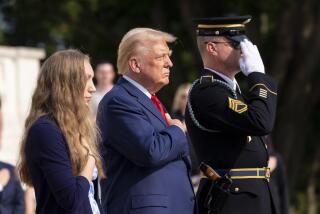Reagan Defends Move to Visit German Graves : ‘We Must Look to the Future,’ He Says After Criticism From Jewish Groups, American Legion
- Share via
SANTA BARBARA — Responding to the outrage of Jewish groups and the American Legion, President Reagan on Friday defended his decision to honor German soldiers killed in World Wars I and II when he visits Europe next month, declaring “we must look to the future.”
Presidential spokesman Larry Speakes said that Reagan was “disturbed that anybody would question his sensitivity” to the Nazi Holocaust and insisted that he had always “taken a very balanced approach to honoring American war dead.”
A White House official, who asked not to be identified, said that a synagogue possibly could be added to the President’s itinerary of European stops in an effort to calm angry Jewish organizations.
But finding a cemetery where U.S. soldiers are buried to also satisfy U.S. veterans groups would be more difficult, particularly in Germany, the official said.
Reagan Unlikely to Cancel
And it was regarded as unlikely that Reagan would cancel his participation with West German Chancellor Helmut Kohl in a wreath-laying ceremony at the Bitburg military cemetery, where 1,800 German soldiers from World War II and 1,000 from World War I are buried. Such a drastic action, the official noted, would embarrass and offend the West German government, an important and loyal ally.
Presidential advisers Friday carefully monitored, through news reports and a deluge of telephone calls to the White House, the growing public controversy arising from Thursday’s announcement that Reagan would visit the cemetery, located near a Nazi tank-staging area for the Battle of the Bulge.
Rabbi David Saperstein of the Union of American Hebrew Congregations said, “I think this was a judgment of grievous error.”
He added: “It is offensive to those who care about the American soldiers who died and those who care about the millions of Jews and non-Jews” who were victims of the “Nazi genocidal effort.”
Reagan earlier turned down a West German government suggestion that he visit the infamous Dachau concentration camp near Munich, saying that this would needlessly rekindle old “guilt feelings” among German citizens.
But Speakes did announce Friday that Reagan had directed Arthur F. Burns, the U.S. ambassador to West Germany, to attend a Holocaust remembrance ceremony on April 21 at the notorious Bergen-Belsen concentration camp. Kohl also will attend.
Elie Wiesel, chairman of the U.S. Holocaust Memorial Council, called an emergency meeting of his group for Monday to appeal to Reagan to alter the schedule of his May 1-10 European trip. The council was formed by the President and Congress to build the U.S. Holocaust Memorial Museum.
“I have rarely seen such outrage,” Wiesel said. “I know the President. I know this is not his sentiment.”
Clarence B. Bacon, national commander of the American Legion, said that by honoring dead German soldiers but not visiting either American graves or a Nazi death camp, Reagan “is perceived as honoring not those who fought for peace and freedom, but those who died for conquest and oppression.”
The legion, which has a membership of 2.5 million veterans, issued a statement saying it was “deeply disappointed” in Reagan’s decision to visit the cemetery.
‘Callously Insensitive’
Hyman Bookbinder, Washington representative for the American Jewish Committee, called the cemetery visit “mind-boggling” and “callously insensitive.”
“I hope he listens to his own personal instincts rather than his advisers,” Bookbinder said. “There are still three weeks for the change to be made.”
Longtime Reagan confidant Michael K. Deaver, who is leaving his post as White House deputy chief of staff May 15 to enter private business, was the aide primarily responsible for putting together the schedule for the President’s European trip. He did not return reporters’ telephone calls Friday.
Speakes, asked whether Reagan felt that he got bad advice on the schedule for the trip, said, “The President has never been one to criticize his staff.”
‘Remember the Past’
Speakes said that he talked by telephone to the vacationing President on Friday and found him “concerned that anybody would question his sensitivity” to the Holocaust. The spokesman said that Reagan always has been “deeply and emotionally involved” in Holocaust remembrance observances and was “disturbed that anybody would question his sensitivity.”
Speakes said the President asked that he be quoted as saying, “While we remember the past with deep sorrow, we must look to the future with a firm resolve that it will never happen again.”
The spokesman also said that Reagan during his presidency “has taken a very balanced approach to honoring American war dead, to honoring the victims of the Holocaust. . . . He honored the American war dead at Normandy (last June). He has honored them many times.”
Speakes added: “The President is approaching this trip as an opportunity--while remembering the past and vowing that we must never repeat it--to look ahead in a spirit of reconciliation and in a spirit of economic prosperity and security cooperation among nations.”
But he also said that “the President’s schedule is, as always on any trip--on any week, on any day--under review. It will be reviewed periodically until the President is actually headed to Europe.”
Republican Sen. Pete Wilson of California, a loyal Reagan supporter, said: “I would urge caution in firming up this schedule. I think he can make appropriate observances in a different fashion that would be better advised.”
Times reporter Zack Nauth in Washington contributed to this story.
More to Read
Get the L.A. Times Politics newsletter
Deeply reported insights into legislation, politics and policy from Sacramento, Washington and beyond. In your inbox twice per week.
You may occasionally receive promotional content from the Los Angeles Times.











